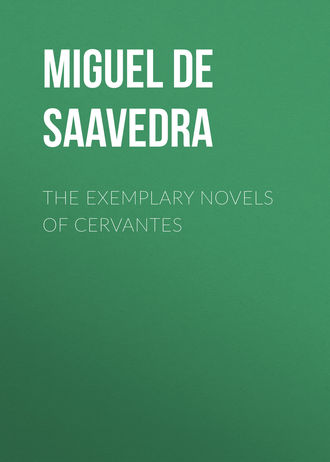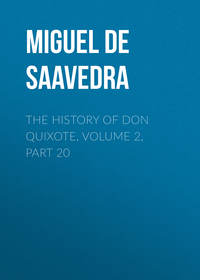 полная версия
полная версияThe Exemplary Novels of Cervantes
Animated with the hope of plunder the soldiers proceeded with the utmost alacrity to execute the pasha's orders, which seemed the more easy as the crew of the brigantine were unarmed, not anticipating any such encounter. It had been now two days under sail, which seemed two centuries to the cadi, who would fain, on the very first of them, have carried his design into effect. But his two slaves represented to him the absolute necessity that Leonisa should first fall sick in order to give colour to the report of her death, and that the feigned malady ought to last some days. The cadi was much more disposed to say that she died suddenly, finish the whole job at once, despatch his wife, and allay the raging fire that was consuming his vitals; but he was obliged to submit to the advice of his two counsellors.
Meanwhile, Halima had declared her design to Mahmoud and Ricardo, who had signified their readiness to accomplish it when passing the Crosses of Alexandria, or entering the castles of Anatolia; but so intolerably did the cadi importune them, that they made up their minds to do so upon the first opportunity that offered. After they had been six days at sea the cadi thought that Leonisa's feigned malady had lasted quite long enough, and was very urgent with them that they should finish with Halima on the following day, and to quiet him they promised that they would do so. But when that day came, which, as they expected, was to witness the accomplishment of their own secret plans, or to be the last of their lives, they suddenly discovered a vessel giving chase to them, with all speed of sails and oars. They were afraid it was a Christian corsair, from which neither party had any good to expect; for if it were one, the mussulmans would be made captive, and the Christians, though left at liberty, would be plundered of everything. Mahmoud and Ricardo, however, took comfort in the prospect of freedom for Leonisa and themselves; nevertheless, they were not without fear of the insolence of the corsairs, for people who abandon themselves to such practices, whatever be their religion or law, are invariably cruel and brutal. The cadi's crew made preparation to defend themselves; but without quitting their oars, and still doing all in their power to escape; but the vessel in chase gained upon them so fast that in less than two hours it was within cannon-shot. Seeing her so close, they lowered their sails, stood to their arms, and awaited the assault, though the cadi told them they had nothing to fear, for the stranger was under Turkish colours and would do them no harm. He then gave orders to hoist the white flag of peace.
Just then Mahmoud chanced to turn his head, and espied another galley of some twenty benches apparently, bearing down upon them from the west. He told the cadi, and some Christians at the oar said that this was a vessel of their own people. The confusion and alarm was now doubled, and all awaited the issue in anxious suspense, not knowing whether to hope or fear it. I fancy the cadi, just then, would have gladly foregone all his amorous hopes to be safe again in Nicosia, so great was his perplexity. It did not last long however; for the first galley, without paying the least regard to the flag of peace, or to what was due to a community in religion, bore down upon his brigantine with such fury as nearly to send it to the bottom. The cadi then perceived that the assailants were soldiers of Nicosia, and guessing what was the real state of the case, he gave himself up for lost; and had it not been for the greed of the soldiers, who fell to plundering in the first instance, not a soul would have been left alive. Suddenly, however, while they were busy with all their might in pillaging, a voice cried out in Turkish, "To arms! to arms! Here's a Christian galley bearing down upon us!" And this indeed was true, for the galley which Mahmoud had descried to the westward was bearing furiously down upon Hassan's under Christian colours; but before it came to close quarters it hailed the latter.
"What galley is that?"
"Hassan Pasha's, viceroy of Cyprus."
"How comes it, then, that you, being mussulmans are plundering this brigantine, on board of which, as we know, is the cadi of Nicosia?"
The reply to this was that they only knew that the pasha had ordered them to take it, and that they, as his soldiers, had done his bidding. The commander of the galley under Christian colours having now ascertained what he wanted to know, desisted from attacking Hassan's and fell upon the cadi's brigantine, killed ten of its Turkish crew at the first volley, and immediately boarded it with great impetuosity. Then the cadi discovered that his assailant was no Christian, but Ali Pasha, Leonisa's lover, who had been laying wait to carry her off, and had disguised himself and his soldiers as Christians, the better to conceal his purpose.
The cadi, finding himself thus assailed on all sides, began loudly to exert his lungs. "What means this, Ali Pasha, thou traitor?" he cried. "How comes it that, being a mussulman, thou attackest me in the garb of a Christian? And you, perfidious soldiers of Hassan, what demon has moved you to commit so great an outrage? How dare you, to please the lascivious appetite of him who sent you, set yourselves against your sovereign?" At these words, the soldiers on both sides lowered their arms, looked upon and recognised each other, for they had all served under one captain and one flag. Confounded by the cadi's words, and by their conscious criminality, they sheathed their blades, and seemed quite discomfited. Ali alone shut his eyes and his ears to everything, and rushing upon the cadi, dealt him such a stroke on the head with his scimetar, that, but for the hundred ells of stuff that formed his turban, he would certainly have cleft it in two. As it was, he knocked the cadi down among the rower's benches, where he lay, exclaiming amid his groans, "O cruel renegade! Enemy of the Prophet! Can it be that there is no true mussulman left to avenge me? Accursed one! to lay violent hands on thy cadi, on a minister of Mahomet!"
The cadi's denunciations made a strong impression on the minds of Hassan's soldiers, who, fearing besides that Ali's men would despoil them of the booty they already looked upon as their own, determined to put all to the hazard of battle. Suddenly they fell upon Ali's men with such vehemence that, although the latter were the stronger party, they soon thinned their numbers considerably; the survivors, however, quickly rallied, and so well avenged their slaughtered comrades, that barely four of Hassan's men remained alive, and those too badly wounded. Ricardo and Mahmoud, who had been watching the fight, putting their heads out every now and then at the cabin hatchway, seeing now that most of the Turks were dead, and the survivors all wounded, and that they might very easily be mastered, called upon Halima's father and two of his nephews to aid them in seizing the vessel. Then arming themselves with the dead men's scimetars, they rushed amidships, shouting "Liberty! Liberty!" and with the help of the stout Christian rowers, they soon despatched all the Turks. Then they boarded Ali Pasha's galley. He had been one of the first slain in the last conflict, a Turk having cut him down in revenge for the cadi, and the galley being defenceless, they took possession of it with all its stores.
By Ricardo's advice, all the valuables on board the brigantine and Hassan's galley were transhipped to Ali's, that being the largest of the three vessels, with plenty of stowage room, and a good sailer. The rowers, too, were Christians, and being highly delighted with the acquisition of their freedom, and with the gifts which Ricardo liberally divided amongst them, they offered to carry him to Trapani, or to the end of the world, if he desired it. After this, Mahmoud and Ricardo, exulting in their success, went to Halima, and told her that if she desired to return to Cyprus they would give her her own brigantine, with its full complement of men, and half the wealth she had put on board it; but as her affection for Ricardo was unabated, she replied that she would rather go with them to Christian lands, whereat her parents were exceedingly rejoiced.
The cadi having by this time got upon his legs again, he, too, had his choice given him either to go into Christendom or return to Nicosia in his own vessel. He replied that, "as fortune had reduced him to his present situation, he thanked them for the boon of his liberty; and that he desired to go to Constantinople to complain to the Grand Signor of the outrage he had received at the hands of Ali and Hassan." But when he heard that Halima was leaving him, and intended to go back to Christianity, he was almost beside himself. Finally, they put him on board his own vessel, supplying him abundantly with all accessories for his voyage, and even giving him back some of his own sequins; and he took leave of them all with the intention of returning to Nicosia; but first he entreated that Leonisa would embrace him, declaring that if she would graciously grant him that favour, it would wipe out the recollection of all his misfortunes. All joined in entreating Leonisa to grant him what he so earnestly desired, since she might do so without prejudice to her honour. She complied, and the cadi besought her to lay her hands on his head, that he might have hopes of his wound being healed.
These adieux concluded, and having scuttled Hassan's galley, they sailed away with a favouring breeze and soon lost sight of the brigantine, on the deck of which stood the unlucky cadi, watching with swimming eyes how the wind was wafting away his property, his delight, his wife, and his whole soul. With very different feelings did Ricardo and Mahmoud pursue their way. They passed in sight of Alexandria, and without shortening sail, or needing to have recourse to their oars, they touched at Corfu, where they took in water; and then without more delay they left behind them the ill-famed Acroceraunian rocks, and descried afar off Paquino, a promontory of the most fertile Trinacria, at sight of which, and of the illustrious island of Malta, their prosperous barque seemed to fly across the waters. In fine, fetching a compass round the island, in four days afterwards they made Lampadosa, and then the island where Leonisa had been shipwrecked, at sight of which she almost swooned.
On the following day the beloved native land they so longed for gladdened their eyes and their hearts. Their spirits rose tumultuously with this new joy, one of the greatest that can be known in this life, to return safe and sound to one's country after long captivity; and one which may compare with it is that of victory achieved over its enemies. There was in the galley a chest full of flags and streamers of various colours, with which Ricardo had the rigging adorned. Soon after daybreak they were within less than a league of the city, when taking to their oars, and uttering every now and then joyous cries, they advanced to the harbour, the shore of which was immediately lined by a great concourse of people; for the gaily adorned galley had been so long in sight, that the whole town had come down to observe it more closely.
Meanwhile, Ricardo had entreated Leonisa to dress herself just as she had appeared in the tent before the two pashas, for he wished to play off a pleasant trick upon his relations. She did so, adding jewels to jewels, pearls to pearls, and beauty to beauty (for it increases with the satisfaction of the heart), to the renewed admiration and astonishment of all. Ricardo and Mahmoud also dressed themselves in the Turkish costume, and made the crew put on the garments of the dead Turks. It was about eight o'clock when they entered the harbour, and the morning was so calm and clear that it seemed as though it were intent on beholding this joyful arrival.
Before coming into port, Ricardo fired a salute with the three pieces belonging to the galley, which were one gun amidships, and two falconets; the town returned the salute with an equal number. The whole shore was in lively commotion, watching the approach of the gaily decked galley; but when they had a nearer view of it, and saw by the white turbans of the pretended mussulmans that it was a Turkish craft, there was a general alarm. Suspecting some stratagem, the people flew to arms, all the soldiers in the town were marched down to the port, and the cavalry scoured the coast. Highly amused at all this, the navigators held on their course, entered the port, and anchored close to the shore. Then running out a plank they all stepped ashore one after the other as if in procession, and falling on their knees kissed the ground with tears of joy – a clear proof to all who witnessed their proceedings that they were no Turks. When all the crew were out of the vessel, Halima with her father and mother, and her two nephews, followed next, all dressed as Turks; and the beautiful Leonisa, her face covered with a crimson veil, and escorted on either side by Mahmoud and Ricardo, closed the procession, while the eyes of the whole multitude were fixed upon her. They too did as the others had done, and knelt and kissed the ground.
Presently the captain and governor of the city advanced towards them, perceiving that they were the principal persons belonging to the vessel. The moment he set eyes on Ricardo he recognised him, ran to him with open arms, and embraced him with the liveliest demonstrations of joy. With the governor came Cornelio and his father, Leonisa's parents and relations, and those of Ricardo, all of whom were among the principal persons in the city. Ricardo returned the governor's embrace and his cordial greeting; held out his hand to Cornelio (who had changed colour at sight of him, and almost quaked for fear), and, holding Leonisa also by the hand, thus addressed the bystanders: "Under your favour, gentlemen, I beg that, before we enter the city and the temple to return the thanks so justly due to our Lord for the great mercies vouchsafed to us in our distresses, that you will listen to a few words I have to say to you." The governor bade him say on, for all present would listen to him with pleasure and in silence. All the principal people then formed a circle round him, and he addressed them as follows: —
"You must well remember, gentlemen, the misfortune which befel me some mouths ago in the garden of the Salt Pits, and the loss of Leonisa: nor can you have forgotten the exertions I made to procure her liberation, since, regardless of my own, I offered all I was worth for her ransom. But this seeming generosity is not to be imputed to me as a merit, since I did but offer my fortune for the ransom of my soul. What has since happened to us both requires more time to relate, a more convenient season, and a speaker less agitated than myself. For the present, let it suffice to tell you that after various extraordinary adventures, and after a thousand disappointments of our hopes of relief, merciful Heaven has, without any merit of ours, restored us to our beloved country, with hearts full of joy and with abundance of wealth. It is not from this, nor from the recovery of my freedom, that springs the incomparable pleasure I now experience, but from that which I imagine this sweet enemy of mine in peace and in war enjoys on seeing herself restored to freedom and to her birth-place. Yet, I rejoice in the general joy of those who have been my companions in misery; and though grievous disasters are apt to alter the disposition and debase worthy minds, it has not been so with the fair destroyer of my hopes, for with more fortitude and invincibility than can well be told, she has passed through the wrecking sea of her disasters and the encounters of my ardent though honourable importunities.
"But to return to the point from which I set out: I offered my fortune for her ransom, and with it the surrender of my soul's desires; I strove for her liberation, and ventured more for her than for my own life. All these things might seem to be obligations of some moment, but I will not have them regarded in that light; what I would have so considered, is that which I now do;" and so saying, he raised his hand and respectfully withdrew the veil from Leonisa's face – it was like removing a cloud from before the sun – and then he continued: "See, Cornelio; here I present to you the prize which you should value above all precious things on earth; and here, beauteous Leonisa, I present to you him whom you have always borne in memory. This is what I would have you all esteem as generosity, in comparison with which to give fortune, life, and honour, is nothing.
"Take her, O fortunate youth, take her; and if your understanding can reach the height of comprehending the greatness of her worth, esteem yourself the most fortunate of mankind. With her I will also give you my whole share of what Heaven has bestowed on us all; it will exceed, as I fully believe, thirty thousand crowns. You may enjoy it all freely and at your ease, and Heaven grant you to do so for many happy years. For my hapless self, since I am left without Leonisa, it is my pleasure to be poor. To want Leonisa, is to find life superfluous."
Here he ceased speaking, as if his tongue clove to the roof of his mouth, but soon afterwards, before any one else had spoken, he exclaimed, "Good heavens! how toil and trouble confuse the understanding! In the eagerness of my desire to do right, I have spoken inconsiderately, for no one can be generous in disposing of what is not his own. What authority have I over Leonisa to give her to another? Or how can I bestow what is so far from being mine? Leonisa is her own mistress, and so much so, that failing her parents (long and happily may they live), her wishes could have no opposition to encounter. Should they meet an imaginary obstacle in the obligations which she, in her good feeling, may think she is under to me, from this moment I cancel them, and declare them null and void. I unsay, then, what I have said, and I give Cornelio nothing, for I cannot; only I confirm the transfer of my property made to Leonisa, without desiring any other recompense than that she will believe in the sincerity of my honourable sentiments towards her, and be assured that they never had an aim unbecoming her incomparable virtue, her worth, and her infinite beauty."
Ricardo closed his speech with these words, and Leonisa thus replied, "If you imagine, Ricardo, that I bestowed any favour on Cornelio during the time when you were enamoured of me and jealous, think that it was in all honour, as being done by the express desire of my parents, who wished to have him for their son-in-law. If you are satisfied with this explanation, I am sure you are no less so with what you have yourself experienced as to my virtue and modesty. I say this, Ricardo, that you may know that I have always been mistress of myself, and subject to no one else except my parents, whom I now entreat humbly, as is meet, to grant me leave and license to dispose of what your magnanimous generosity has given me."
Her parents said she might do so, for they relied on her great discretion that she would make such use of it as would always redound to her honour and advantage. "With that permission, then," said Leonisa, "I beg it may not be taken amiss if I choose rather to seem overbold than ungrateful; and so, worthy Ricardo, my inclination, hitherto coy, perplexed, and dubious, declares in your favour, that the world may know that women are not all ungrateful. I am yours, Ricardo, and yours I will be till death, unless better knowledge move you to refuse me your hand."
Ricardo was almost beside himself to hear her speak thus, and could make no other reply than by falling on his knees before her, grasping her hands, and kissing them a thousand times, with delicious tears. Cornelio wept with vexation, Leonisa's parents for joy, and all the bystanders for admiration and sympathy.
The bishop, who was present, led them with his blessing to the church, and dispensing with the usual forms, married them at once. The whole city overflowed with gladness, which it testified that night by a splendid illumination, and for many days following in jousts and rejoicings given by the relations of Ricardo and Leonisa. Halima, who had lost all hope of having Ricardo for her husband, was content to become the wife of Mahmoud, having returned with him to the bosom of the church. Her parents and her two nephews were, by Ricardo's bounty, presented with so much out of his share of the spoil as sufficed to maintain them for the rest of their lives. In a word, all were happy to their heart's content; and the fame of Ricardo, spreading beyond the limits of Sicily, extended throughout all Italy and beyond it. He was universally known as the Generous Lover, and his renown is still prolonged in the persons of the many sons borne to him by Leonisa, who was a rare example of discretion, virtue, modesty, and beauty.
THE SPANISH-ENGLISH LADY
Among the spoils which the English carried off from the city of Cadiz,78 was a little girl of about seven years old. An English gentleman, named Clotald, commander of a squadron of vessels, took her to London without the knowledge of the Earl of Essex, and in defiance of his general orders. The parents complained to the earl of the loss of their child, and implored him, since he had declared that property alone should be seized, and the persons of the inhabitants should be left free, they should not, besides being reduced to poverty, suffer the additional misery of being deprived of their daughter, who was the very light of their eyes. The earl caused it to be proclaimed throughout his whole army, that whoever had possession of the child, should restore her on pain of death; but no threatened penalties could constrain Clotald to obey; in spite of them, he kept the child concealed in his ship, being fascinated, though in a Christian manner, with the incomparable beauty of Isabella, as she was called. In fine, her inconsolable parents were left to mourn her loss, and Clotald, rejoicing beyond measure, returned to London, and presented the pretty child to his wife, as the richest prize he had brought home from the war.
It happened fortunately that all the members of Clotald's household were catholics in secret, though in public they affected to follow the religion of the state. Clotald had a son about twelve years old, named Richard, who was brought up by his parents to love and fear God, and to be very stedfast in the truths of the catholic faith. Catherine, the wife of Clotald, a noble, Christian, and prudent lady, conceived such an affection for Isabella, that she reared her as if she was her own daughter; and the child was so well endowed by nature, that she readily learned all they taught her. Time and the kind treatment she received, gradually wore out from her recollection that which her parents had bestowed upon her; not so much so, however, but that she often thought of them with a sigh. Though she learned English, she did not forget her native tongue, for Clotald took care to bring Spaniards secretly to his house to converse with her, and thus it was, that without ceasing to speak Spanish, she became as proficient in English as if she had been born in London.
After having learned all kinds of work becoming a young lady of good birth, she was taught to read and write more than passably well; but what she excelled in above all, was in playing all sorts of instruments suitable to her sex, with extraordinary perfection of musical taste and skill, and with the accompaniment of a voice which Heaven had endowed with such melody that when she chanted she enchanted. All these graces, natural and acquired, gradually inflamed the heart of Richard, whom she loved and respected as the son of her lord. At first his affection for her was like that of a brother for a sister, but when she reached her twelfth year, this feeling had changed into a most ardent desire to possess her, but only in the honourable way of becoming her lawful spouse; for Isabella's incomparable virtue made it hopeless to obtain her in any other way, nor would he have done so even, if he could, for his own noble disposition, and the high estimation in which he held her, forbade any bad thought to take root in his soul.
A thousand times he determined to make known his passion to his father and mother, and as often broke his resolution, knowing that they had destined him to be the husband of a young Scotch lady of great wealth and good family, who, like themselves, secretly professed the catholic faith; and it seemed clear to him, that after having betrothed him to a lady of rank, they would not think of bestowing him on a slave, if that name could be applied to Isabella. Agitated by these distressing reflections, not knowing what course to pursue or whom to consult, he fell into a melancholy that nearly cost him his life. But thinking it was a very cowardly thing to let himself die without making any kind of effort for his own relief, he strove to gather up courage enough to declare his feelings to Isabella.









